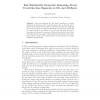Free Online Productivity Tools
i2Speak
i2Symbol
i2OCR
iTex2Img
iWeb2Print
iWeb2Shot
i2Type
iPdf2Split
iPdf2Merge
i2Bopomofo
i2Arabic
i2Style
i2Image
i2PDF
iLatex2Rtf
Sci2ools
113
Voted
DAGM
2004
Springer
2004
Springer
Fast Statistically Geometric Reasoning About Uncertain Line Segments in 2D- and 3D-Space
This work addresses the two major drawbacks of current statistical uncertain geometric reasoning approaches. In the first part a framework is presented, that allows to represent uncertain line segments in 2D- and 3D-space and perform statistical test with these practically very important types of entities. The second part addresses the issue of performance of geometric reasoning. A data structure is introduced, that allows the efficient processing of large amounts of statistical tests involving geometric entities. The running times of this approach are finally evaluated experimentally.
| Added | 01 Jul 2010 |
| Updated | 01 Jul 2010 |
| Type | Conference |
| Year | 2004 |
| Where | DAGM |
| Authors | Christian Beder |
Comments (0)

